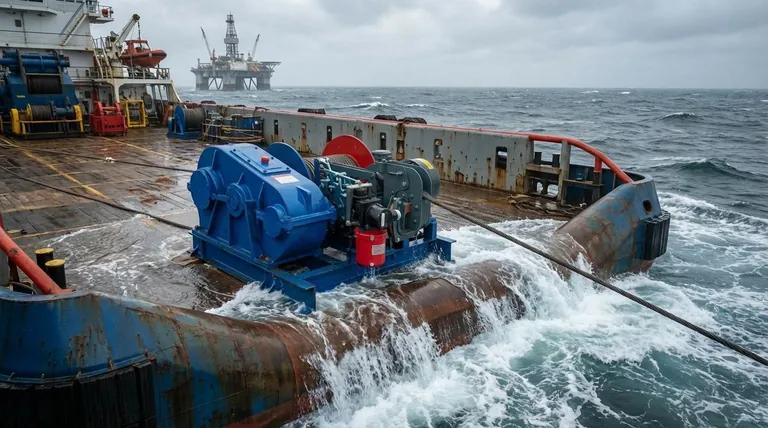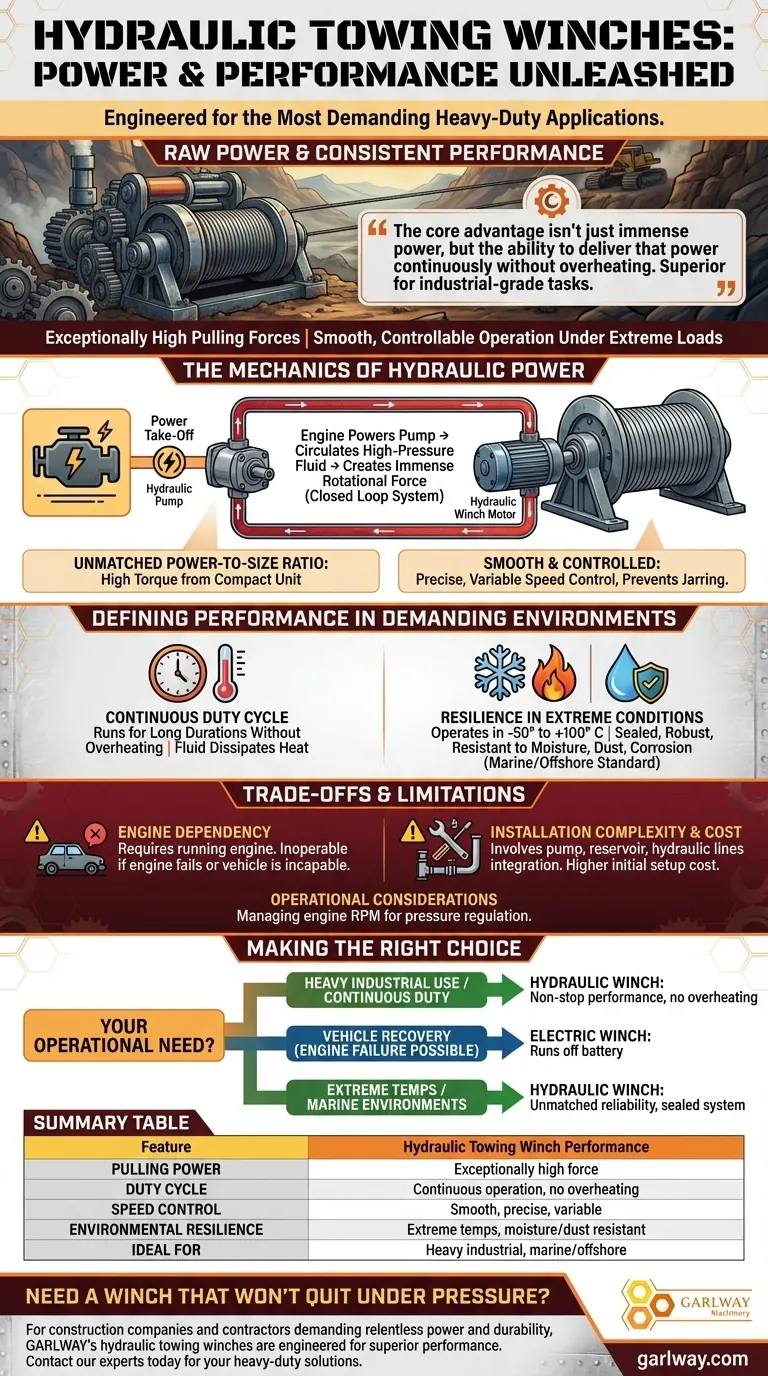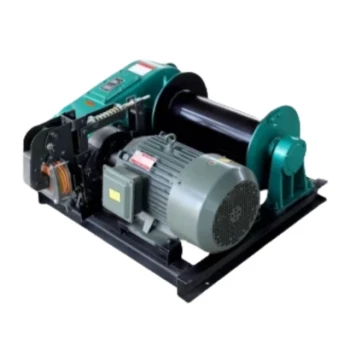In terms of raw power and consistent performance, hydraulic towing winches are engineered for the most demanding heavy-duty applications. They generate exceptionally high pulling forces through robust hydraulic motors and drivetrain systems. This design ensures smooth, controllable operation under extreme loads and challenging conditions where other types of winches might fail.
The core advantage of a hydraulic winch isn't just its immense power, but its ability to deliver that power continuously without overheating. This makes it the superior choice for industrial-grade tasks and relentless operation in harsh environments.

The Mechanics of Hydraulic Power
Hydraulic systems are fundamentally designed for force multiplication and endurance. Understanding how they work clarifies why they are so powerful and reliable for towing and recovery.
How a Hydraulic System Generates Force
A hydraulic winch is powered by a vehicle's running engine, which operates a hydraulic pump. This pump circulates hydraulic fluid under high pressure to the winch motor, creating immense rotational force.
This system is a closed loop, meaning the fluid is constantly recycled, allowing for sustained operation.
Unmatched Power-to-Size Ratio
For their physical size, hydraulic motors produce a tremendous amount of torque. This high power density means you get significant pulling capacity from a relatively compact and durable unit.
Smooth and Controlled Operation
The nature of pressurized fluid allows for exceptionally precise and variable speed control. This is critical when handling heavy, sensitive loads, as it prevents jarring or sudden movements that could cause damage or create unsafe conditions.
Defining Performance in Demanding Environments
True performance is about more than just pulling capacity. It's about reliability and endurance when conditions are at their worst. This is where hydraulic systems excel.
Continuous Duty Cycle
Unlike many electric winches that can overheat during prolonged use, hydraulic winches are built for continuous duty cycles. The circulating hydraulic fluid helps dissipate heat, allowing them to run for long durations without performance degradation or risk of motor failure.
Resilience in Extreme Conditions
Hydraulic systems are inherently sealed and robust. They are designed to function optimally in extreme temperatures, with some rated for ranges from -50° to +100° C.
Their construction makes them highly resistant to moisture, dust, and corrosive elements, making them the standard for marine, offshore, and military applications.
Understanding the Trade-offs and Limitations
While powerful, hydraulic winches are not the right solution for every situation. Their design comes with specific requirements and potential drawbacks that are critical to consider.
The Engine Dependency
The most significant limitation is that a hydraulic winch requires a running engine to power the hydraulic pump. If the vehicle's engine is stalled, damaged, or cannot run—for instance, if the vehicle is on its side—the winch is inoperable.
Installation Complexity and Cost
Installing a hydraulic winch is more involved than an electric one. It requires integrating a pump, reservoir, and hydraulic lines into the vehicle's engine system. This adds to the overall cost and complexity of the setup.
Operational Considerations
While modern systems are user-friendly, the "challenging operation" noted by some users often refers to the initial setup and the need to manage the vehicle's engine RPM to regulate hydraulic pressure effectively.
Making the Right Choice for Your Application
Selecting the right winch depends entirely on your primary operational needs and the environment you face.
- If your primary focus is heavy industrial use or continuous-duty cycles: A hydraulic winch is the superior choice due to its non-stop performance and resistance to overheating.
- If your primary focus is vehicle recovery where engine failure is a possibility: An electric winch, which runs off the battery, provides a crucial operational advantage if the engine is disabled.
- If your primary focus is operating in extreme temperatures or marine environments: The sealed, robust nature of a hydraulic system offers unmatched reliability and longevity.
Ultimately, choosing a hydraulic winch is an investment in relentless power and operational endurance for when performance is non-negotiable.
Summary Table:
| Feature | Hydraulic Towing Winch Performance |
|---|---|
| Pulling Power | Exceptionally high force from robust hydraulic motors |
| Duty Cycle | Continuous operation without overheating |
| Speed Control | Smooth, precise, and variable control |
| Environmental Resilience | Operates in extreme temperatures (-50° to +100° C), resistant to moisture/dust |
| Ideal For | Heavy industrial use, marine/offshore, and relentless applications |
Need a winch that won't quit under pressure? For construction companies and contractors who demand relentless power and durability, GARLWAY's hydraulic towing winches are engineered for superior performance in the toughest conditions. Contact our experts today to find the perfect winch solution for your heavy-duty projects.
Visual Guide

Related Products
- Electric and Hydraulic Winch for Heavy Duty Applications
- Hydraulic Winding Engine Harbor Freight Winch
- Electric Hoist Winch Boat Anchor Windlass for Marine Applications
- Best 18000 Pound Drum Anchor Trailer Winch
- Warn Winch Windlass Boat Trailer Winch
People Also Ask
- How are winches utilized in the defense sector? Ensuring Mission Success with Critical Recovery & Logistics
- What are the main components of a wire rope electric hoist? | The Key Parts Explained
- How are winches utilized in vehicle recovery operations? Your Ultimate Guide to Safe Extraction
- What weight limits should be observed when using a hoist? Essential Guide to Safe Lifting Capacity
- How do remote control capabilities enhance electric winch operation? Achieve Superior Safety and Precision
- What safety features should be considered in a winch for vehicle loading? Ensure Safe & Secure Loading Every Time
- What should you check about the hook latch before using the winch? Ensure a Safe and Efficient Winching Operation
- How much weight can a boat winch lift? Understand the Critical Capacity Limits for Safe Operation



















